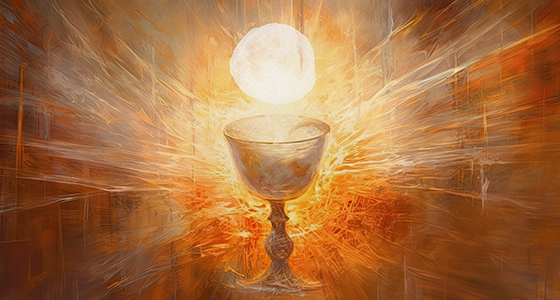Do You Want the Eucharist to Be True?

I want first to address those who might still be unsure of whether to believe in the Eucharist. To them, I would ask (or you might ask), “Do you want the Eucharist to be true?”
Since our desires don’t make something true or not, that question may seem irrelevant, but it isn’t. Faith involves the intellect and the will. It’s not just about knowing, for instance, that God must logically exist. It’s about the heart saying “yes” to him and desiring him. If we don’t want to believe, God always gives us plenty of room—and plenty of excuses—not to believe.
This is easy to see in the case of atheists. From a purely rational perspective, atheists should want God to exist, even if they believe he doesn’t. After all, the Christian claim involves an infinitely good God calling us to enjoy perfect happiness with him forever. Who wouldn’t want that? And yet, people like the “anti-theist” Christopher Hitchens say things like, “I do not envy believers their faith. I am relieved to think that the whole story is a sinister fairy tale; life would be miserable if what the faithful affirmed was actually the case.” He even claimed he could not “imagine anything more horrible or grotesque” than “cradle-to-grave divine supervision,” arguing that “it would be worse, in a way, if the supervision was benign.”
This is nonsensical, if we’re thinking rationally. Nothing is more horrible or grotesque than infinite goodness? But it is tremendously revealing about Hitchens’s heart, and the irrationality of some unbelievers’ hatred of God.
Perhaps we can even see something of this in our own lives as Christians. Logically, we should want the Eucharist to be really Jesus, even if we believe it isn’t. After all, the Trinitarian God is inherently relational, and we are made in his image. We are made for relationship with him and with one another, and the whole of Christianity involves living those relationships faithfully and well (cf. Matt. 22:35-40). This desire of the heart is expressed in the language of seeing God. As the Psalmist proclaims, “Thy face, Lord, do I seek” (Ps. 27:8). We have a deep hunger for God, and a hunger to look upon God. And the great Christian promise is that “when he appears we shall be like him, for we shall see him as he is” (1 John 3:2).
The Eucharist fulfills our spiritual longing in a unique way, beyond anything else offered on Earth. In the Eucharist, we both look upon Christ and commune with him bodily. Through the Eucharist, we are drawn into deeper communion with our neighbor. In the words of St. Francis de Sales, it is the “center of the Christian religion, heart of devotion, and soul of piety, the ineffable mystery that comprises within itself the deepest depths of divine charity, the mystery in which God really gives himself and gloriously communicates his graces and favors to us.”Who wouldn’t want that?
Of course, my argument isn’t that the Eucharist must be true because it sounds good. It’s simply that if we find ourselves opposed to the idea of the Eucharist, or hoping the Catholic claim isn’t true, or happy that we think it isn’t true, this reveals something about our own hearts.
The Eucharist is really Jesus.
Order your copy of The Eucharist is Really Jesus today!
Recent Posts
-
Are We Superior to the Early Christians?
If the early Church was the Catholic Church, why can’t we say that Christians just lost their way ea …Jul 15th 2024 -
Did the Early Christians Get Things Wrong?
You can find countless variations of the claim that early Christians believed Protestant things: …Jul 1st 2024 -
How to Respond When the World Tells Us We Can "Build Our Own Deity"
The necessity of revelation and of knowing God on his terms is not accepted in our culture today. A …Jun 22nd 2024









